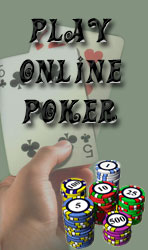Pokerwiner.com → Lessons of poker
GETTING A FREE CARD
If not giving a free card is that important, it should be clear how valuable it is to get a free card when you don’t have the best hand.
That free card might turn a hand you would have folded into a winner or save you a bet on a hand with which you intended to call anyway.
Of course, getting a free card against reasonably good players is not easy.
One way is to put in a small raise on an early round in the hope that everyone still in the pot odds will check around to you on the next round. Then you can also check.
To make this play you must be sure you will act after your opponent (or opponents) on the next round, so the play is used most commonly in a game like holdem where the order of betting is fixed by the position of the dealer.
Other ways of getting a free card fall under the heading of tricks and plays.
For example, you can bet out of turn to make your opponent check, which is not quite ethical but usually legal.
After being reminded it’s not your turn to act, you retrieve your bet, and when your opponent checks, you also check.
You can take chips from your stack as though you intend to raise, and then when your opponent decides not to bet after all, you check.
Sometimes just getting your chips ready to call, as though you’re enthusiastic about calling, will prevent your opponent from betting.
However, against top poker players such plays usually work only to create a bad impression, and they rarely succeed more than once or twice.
POSITION AND THE FREE CARD
When a hand is reduced to two opponents, the player who acts first cannot give himself a free card, but the player who acts second can.
If you are second to act and your opponent has checked to you, you should bet when you are pretty sure you have the best hand but if you suspect you have the worst hand, you can check and give yourself a free card.
When you check in first position, you are not giving yourself a free card; you are offering your opponent a free card.
That player can decide whether to take it or to bet. Consequently, in first position you have to bet some hands you wouldn’t bet in last position because you do not want to give your opponent the option of checking for a free card with the worst hand.
With a marginal hand you should bet in first position, especially if you don’t fear a raise, because if your opponent has a worse hand than your, he will check behind you when you check, making you wish you had bet.
On the other hand, if your opponent’s hand is indeed better than yours, he will bet when you check. So you couldn’t give yourself a free card anyway.



